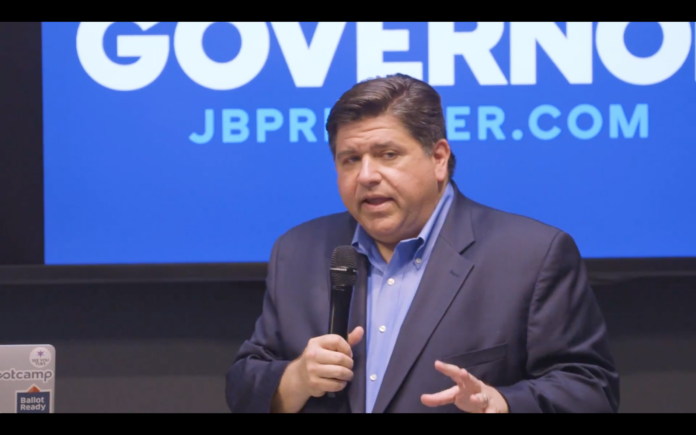By Brad Weisenstein
The idea of dividing Chicago off into its own state has an appeal to some, with state lawmakers from downstate Illinois occasionally introducing bills to formalize the Forgottonia split.
The idea that the corruption and political ills of Illinois all emanate from The Chicago Machine lets the rest of us comfortably disavow responsibility for it and doubt our ability to fix it. But the cogs are spread across Illinois, and a unified effort to remove them could halt The Machine. Division is a potent political device, especially when it is manufactured.
And it is the tool of choice for Illinois Gov. J.B. Pritzker in his push for a “fair tax.”
At its core the statewide ballot question Nov. 3 asks Illinoisans to give up the flat tax protection the Illinois Constitution’s authors fought hard to include 50 years ago. By unifying taxpayers so one cannot be taxed without taxing all, the flat tax ensures state lawmakers do not increase taxes without paying a political price. After they last raised the income tax to the current 4.95 percent in 2017, nearly a third of state lawmakers quit or got voted out of office.
But if lawmakers can divide and conquer by demonizing those at a certain income level, it won’t be long until lawmakers’ irresponsible spending has them slicing off another income group and then another until they get to the meat of the income distribution – the middle class. Progressive taxation allows them to categorize who they want and tax them what they want, with a simple majority vote.
It also allows them to target the 2 million Illinoisans age 65 and older by labeling some as “rich retirees.” Once they can tax some, expanding taxes to more is easier. Three members of “Team Pritzker” already said they needed progressive rates to be able to impose retirement taxes. Illinois is one of the few states that does not tax retirees, but all 32 states with progressive rates tax some form of retirement income.
“The real damage is going to be farther down the road,” said retired Chicago Police officer Don Wojtowicz, who is suing along with other retirees over the tax amendment’s biased ballot language. “How could there not be further tax hikes down the road, when you look at how deep the state is in the hole already?”
A progressive tax is projected to feed another $3 billion into the maw of a state government that has failed to balance a budget in 20 years, allows $8 billion in overdue bills to sit ignored and has neglected public pensions until $140 billion in debt has accumulated. That pension debt is a huge problem, but examine Pritzker’s plan and you see only $200 million from his $3 billion “fair tax” is promised – not guaranteed – toward pensions.
He wants most of the money for new spending.
The Springfield tragicomedy has had plenty of bad actors from both parties who make promises they can’t keep, namely approving costlier pension benefits the state has no way to pay for. That’s not a revenue problem – it’s an irresponsible government problem. Illinois taxpayers for years have paid the nation’s highest state and local tax burden, with the state income tax hiked by nearly one-third in 2017. You don’t stop state lawmakers’ overspending addiction by giving them more of their drug of choice.
And you don’t change their habits by giving them the means to produce what they crave.
Only one other feckless state has moved to progressive income taxes since 1996, Connecticut. There it led to a 13 percent middle class tax hike, a 35 percent property tax increase, a jump in the poverty rate and it took 360,000 jobs out of the economy. All that damage, and state finances are still in shambles.
Not to mention, we are still getting hit by the COVID-19 recession. Illinois saw the nation’s worst job loss in September – shedding 12,000 payroll jobs – and is home to the highest unemployment rate in the Midwest.
Economists and former President Barack Obama agree you don’t raise taxes in a recession. But Pritzker’s proposal would increase taxes by up to 47 percent on over 100,000 Illinois small businesses, which are where the lion’s share of the state’s jobs come from. That is why the Illinois Farm Bureau, the Illinois State Black Chamber of Commerce, the Illinois Chamber of Commerce, the Technology and Manufacturing Association and the Illinois Manufacturers’ Association all oppose the tax plan for the damage it would do to Illinois’ fragile economic recovery and the jobs it would kill.
They have been joined by the editorial boards of Illinois newspapers: the Chicago Tribune, the Northwest Herald, the Daily Herald, Crain’s Chicago Business and the Champaign News-Gazette have all come out against the “fair tax.” All worry about where state lawmakers’ newfound taxing powers would lead.
Whether you are from Forgottonia or Chicagoland, division by income or geography would serve us poorly. We are stronger together, whether in opposing corrupt politics or excessive taxation, which is why Illinois voters should keep the flat tax and vote “no” on the “fair tax” amendment.
Originally published by The Center Square. Republished with permission.












[…] Georgia voters overwhelmingly voted in favor of a constitutional amendment that requires transparency in government spending. […]